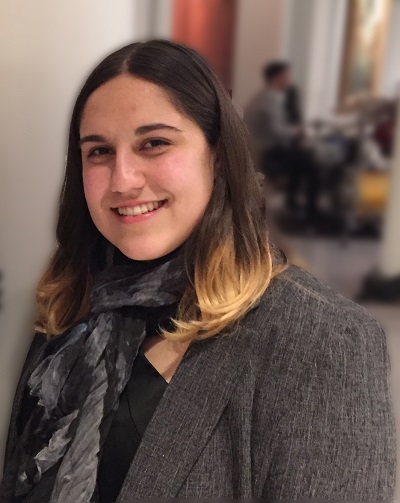
Jessica Micallef, doctoral candidate studying physics and computational mathematics, science and engineering (CMSE) in the College of Natural Science, has had an interest in physics for most of her life. Out of the 60 students in her high school class, she was the only woman to choose physics as her science elective and one of just three students to choose physics for the topic of her senior essay.
“In high school, I served as a volunteer at the fire station and while working there developed a theory I wanted to test,” Micallef said. “I started to explore the feasibility of adapting radio jammers to emergency response vehicles. I researched a potential apparatus and determined that it would only require a small amount of power for emergency response vehicles to jam commercial radios in civilian cars within a certain radius. I later received a provisional patent on the idea and began talking to engineers about incorporating this into car designs. In my freshman year of college, I submitted the idea to the University of Michigan’s 1000 Pitches contest as a proposal for a technological innovation. I won my category after competing against hundreds of other pitched ideas. This was my first experience with physics research, pursuing an idea that would increase public safety and help communities.”
Her current research focuses on a neutrino physics experiment called IceCube, which is conducted in the South Pole. Neutrinos are nearly mass-less particles that travel almost at the speed of light, and are extremely difficult to detect. Scientists have known about neutrinos for decades, but there are still basic properties, such as the exact neutrino mass, which haven’t yet been measured. In the IceCube research, a detector is buried under a kilometer of ice that is used to find the path and energy deposited by neutrino interactions.
“I became interested in this area of study after a summer internship at Lawrence Berkeley National Lab working on neutrino research,” Micallef said. “I found all the open questions about this particle to be very intriguing. The Nobel Prize in physics was awarded to two neutrino research groups in 2015. Neutrino research is one of the current frontiers of particle physics. We are currently at the stage where finding out more about these particles will have a ripple effect on how we define the rules governing new physics models. My work should help to contribute to some of the results that neutrino experiments have been exploring, with particular focus on the neutrino oscillation property.”
As a woman with a Bachelor of Science degree in both physics and screen arts and cultures, Micallef is using her skillset to appeal to young students through media to further promote an interest in STEM.
“My newest project is to create a video of interviews with an emphasis on women and minorities – from undergraduates to professionals – in all STEM fields, exploring their diverse interests, hobbies, backgrounds, and characteristics,” she said. “Currently, I am coordinating these interviews to edit together into a series of short videos. I will share it online with the goal of inspiring the next generation to consider STEM fields and understand that they do not have to fit a certain stereotype to pursue them. I intend for my career to have an emphasis on mentoring undergraduate and graduate students. In my research experiences, I have benefitted from various mentors as they have sparked my curiosity in physics research and have helped me develop my confidence. This will be one area that I emphasize when working with students as a mentor. I hope to extend my mentoring through outreach to the community, to inform them about current physics findings and stimulate young students’ interest in physics.”
The National Science Foundation Graduate Research Fellowship award consists of a three-year annual stipend of $34,000, along with a $12,000 cost of education allowance for tuition and fees. Micallef said this money will specifically fund her upcoming research.
“It is a huge honor for me to receive this award,” Micallef said. “It means that I can dedicate my time to research for three years. The NSF fellowship is highly regarded in my field, so it may open up even more opportunities for me in the long run, such as getting a grant to travel internationally to work on my research.”


